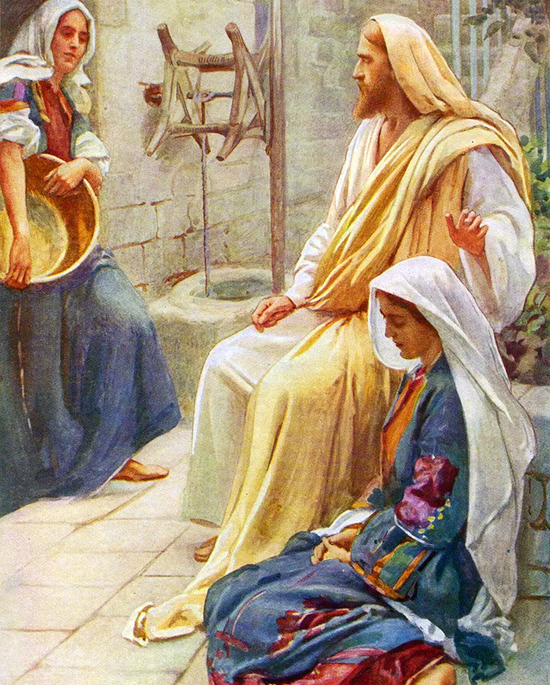Christian Art | Jesus With Mary And Martha
Office Of Readings | Week 30, Wednesday, Ordinary Time | A Reading From The Letter Of Pope Saint Clement I To The Corinthians | Let Us Follow The Way Of Truth
‘Let us follow the way of truth.’
Saint Clement’s letter turns from theological reflection to moral exhortation. Its concern is the interior and social coherence of the Christian community at Corinth, expressed through humility, discipline, and collective worship. The passage belongs to the part of the epistle where Clement seeks to restore harmony after the divisions that had arisen within the Church—a recurring concern in early Christian correspondence, notably in Paul’s own letters to the same community.
Clement’s appeal to unity of mind indicates a conception of the Church not as a voluntary association but as a single organism ordered by divine will. To ‘put on’ unity recalls the Pauline idiom of ‘putting on Christ’ (Romans 13:14): moral concord is not a mere agreement of opinion but a clothing of the self in an ordered pattern of thought and action. This order is achieved through humility and self-control—virtues that counteract the verbal aggression and ambition that Clement identifies in ‘backbiting and slander’.
The call to be ‘righteous in deed, and not in word only’ distinguishes genuine piety from rhetorical profession. Clement’s community would have been familiar with the prestige of eloquence in Greco-Roman society, but here he inverts that cultural value. Speech without action is vanity; moral speech must be substantiated by ethical conduct. The cited text—‘He who says much hears much in his own turn’—suggests a reciprocal moral economy in which words invite judgment upon their speaker.
Clement then reasserts the central claim that everything is from God. This phrase functions as a theological premise for moral obedience. Since all being and order derive from God, to act rightly is to align oneself with the structure of creation. The quotation from Isaiah—‘See, the Lord is coming, and the reward he brings is before him’—frames moral action within an eschatological horizon: divine justice is certain, and reward corresponds to work.
The reference to the angelic host situates human worship within the cosmic hierarchy. Angels serve God’s will; humanity, by uniting in praise, imitates that obedience. The vision from Daniel—‘Ten thousand times ten thousand stood before him’—is an image of ordered multitude, reinforcing the theme that harmony in heaven should be reflected in the Church on earth.
Clement’s sequence of gifts—‘life with immortality, glory with righteousness, truth with confidence, self-control with holiness’—presents a structured vision of the moral life. Each pair links an ethical disposition to a divine reward: moral transformation is inseparable from participation in God’s own life. The list is not speculative but practical; it maps the virtues that sustain the community’s internal peace.
The passage ends with the phrase the way of truth. For Clement, truth is not primarily intellectual but moral and relational—it is a way, not a theory. To ‘follow the way of truth’ is to conform conduct to the reality of God’s order, casting off the disorder of sin. His language of waiting—‘those who await him’—connects ethical steadfastness with eschatological expectation: faith is not passive belief but disciplined anticipation of the divine promise.

A Reading From The Letter Of Pope Saint Clement I To The Corinthians | Let Us Follow The Way Of Truth
Let us put on the unity of mind, thinking humble thoughts, exercising self-control, keeping ourselves far from all backbiting and slander, being righteous in deed, and not in word only. Scripture says: He who says much hears much in his own turn. Or does the easy talker think that he is righteous?
It is our duty then to be eager to do good, for everything is from God. He warns us: See, the Lord is coming, and the reward he brings is before him, for paying each according to his work. He urges us, who believe in him with all our heart, not to be idle or careless in any good work. Our boasting and our confidence must rest on him. Let us be subject to his will. Let us look carefully at the whole host of his angels; they stand ready and serve his will. Scripture says: Ten thousand times ten thousand stood before him, and a thousand thousand served him, and cried out: Holy, holy, holy is the Lord of hosts; the whole creation is full of his glory.
We, too, dutifully gathered together in unity of mind, should cry out to him continuously as with one voice so as to share in his great and glorious promises. It is written: Eye has not seen, ear has not heard, man’s heart has not conceived, what great things have been prepared for those who wait for him.
Beloved, how blessed, how wonderful, are God’s gifts! Life with immortality, glory with righteousness, truth with confidence, self-control with holiness: all these are the gifts that fall within our understanding. What then are those gifts that are in store for those who wait for him? Only the most holy Creator and Father of the ages knows their greatness and their splendor.
We should then strive with the greatest zeal to be found among the number of those who await him, so that we may share in the promised gifts. How will this be, beloved? If our mind is fixed on God through faith, if we are diligent in seeking what is pleasing and acceptable to him, if we fulfill what is according to his blameless will and follow the way of truth, casting away from ourselves all that is unholy.
Christian Prayer With Jesus
God of creation and promise,
you bring light from darkness and life from the dust of the earth.
In the stillness of your order we behold your truth,
and in the rhythm of day and night we learn your faithfulness.
Keep us steadfast in the work of your Spirit.
May our hearts be bound to you in trust,
our minds shaped by your wisdom,
our hands strengthened for what is good.
Teach us to seek your will without fear,
and to rest in your providence that sustains all things.
As the heavens move in harmony to your word,
so may your Church be gathered in unity of mind,
set free from pride and strife,
and renewed in the peace that comes from obedience.
Grant us, O Lord,
to await with quiet confidence the life that you have promised,
through Jesus Christ, firstborn from the dead,
in whom all things hold together,
and to whom be glory and dominion, now and forever.
Amen.
Glossary Of Christian Terms
Unity of mind – A phrase signifying the interior and social coherence of the Christian community. In early Christian thought, unity of mind was not uniformity of opinion but a shared orientation toward the divine will. It reflected participation in the one Spirit rather than agreement by compulsion.
Self-control (Greek: enkrateia) – A central virtue in both Stoic and Christian moral teaching. In Clement’s context, self-control refers to restraint of speech, desire, and ambition. It expresses freedom from the tyranny of impulse and is a prerequisite for genuine obedience to God.
Eschatology – The theological understanding of ‘last things’ — the final fulfilment of God’s purpose in history, including judgement and resurrection. Clement’s reminder of divine recompense situates moral life within an eschatological frame: human action acquires meaning in relation to ultimate accountability.
Angelic hierarchy – Clement’s reference to the ‘host of angels’ reflects the Jewish and early Christian view of the cosmos as ordered by ranks of spiritual beings. Their unceasing service to God forms the heavenly counterpart to human worship, a model of disciplined unity and perpetual praise.
Righteousness (Greek: dikaiosynē) – Not merely legal rectitude but alignment with divine justice. In Clement’s use, righteousness is both ethical conduct and participation in God’s fidelity. To act righteously is to mirror the order and harmony that characterise God’s creative governance.
The way of truth – A moral and existential path rather than a body of propositions. Early Christianity often used this term to describe the pattern of life that reflects divine reality. It implies conformity to God’s will through integrity of action and constancy in hope.
Concord – A social and spiritual virtue central to Clement’s theology of the Church. Concord (homonoia) denotes ordered unity in diversity — an image of the Church as a single body harmonised by charity and common purpose.








